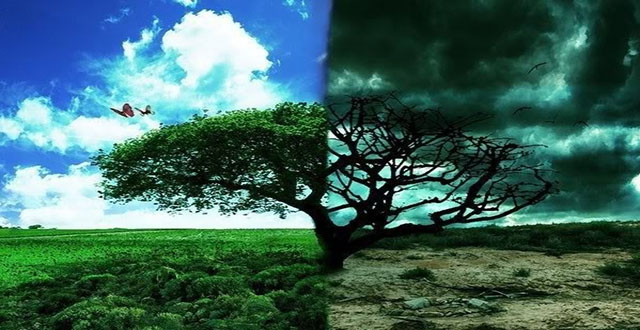Is there any death in Paradise and Hell?
In the greater resurrection which is a world next to the intermediate world, all human beings from the first to the last are gathered and enter a new phase of living; they receive the rewards for their deeds and actions in the worldly life.[1]
The Quran, traditions and rational arguments agree that there is no death after the Day of Judgment occurs and human beings go to Paradise and Hell. We shall now mention a few of those verses:
The Holy Quran uses as many as seventy names to make a reference to the Day of Judgment. Each name refers to a particular attribute or feature. For example, the “Day of Resurrection” used in the Quran refers to the fact that all human beings and existents are resurrected on this Day. Since this day is eternal and there is no death in it, it is called the Day of Eternal Life (yawm al-kholud)[2]. This name has been mentioned in the holy chapter Qaf.[3]
In addition, the Quran names the people of Paradise and Hell more than seventy times describing them as immortal. We mention two verses of the Quran as examples:
“Nay, those who seek gain in evil, and are girt round by their sins,- they are companions of the Fire: Therein shall they abide (For ever).”[4]
“But those who have faith and work righteousness, they are companions of the Garden: Therein shall they abide (For ever).”[5]
It has also been stated in the traditions that there is no death in the hereafter. For example, Allamah Baqir Majlisi mentions different traditions in the eighth volume of his Behar al-Anwar (chapter 26). In one of the traditions narrated by him in this book, it has been said that death is beheaded in front of the people of Paradise and Hell like a sheep. The Prophet has been reported as having said: “When God takes the people of Paradise to Paradise and the people of Hell to Hell, death is brought to them and decapitated like a sheep in front of them. There and then a harbinger calls out:
“یا اهل الجنة خلود فلا موت یا اهل النار خلود فلا موت”[6]
That is, there is no death on the Day of Judgment; life in the hereafter is characterized by immortality and perpetuity.[7]
Rationally, man’s soul is abstract and every abstract thing is immortal. Therefore, there is no death in the hereafter and human beings do not die after they go to Paradise or Hell.
Some of the arguments presented by Muslim philosophers and theologians on the immateriality of the soul are as under:
1. The soul perceives the general concepts or generalities. Generality is abstract, so is its perceiver.
2. The soul has power over matters which the bodily things have no power over. For example, the soul can imagine infinite things but the body cannot.
3. When we see that all those things which are perceived by our senses are perceived by one thing, it stands to reason that the soul is abstract. That is because the senses do not know anything about one another’s perceptions. For example, the eye sees the whiteness of an object like cubic sugar but it does not know that it is sweet. Or we put something which we have not seen in out mouth; we feel its taste on our tongues but we do not see its color. It is therefore clear that there is an abstract general thing in us which perceives all these varied things.
4. The physical powers get worn out and start malfunctioning over time but the soul is not as such. That is because too much intellection further strengthens it. The soul is therefore not from the category of the body; it is abstract.[8]
5. Another reason for the abstractness of the soul is oneness or unity of the personality. The body is susceptible to changes but there is one thing that never accepts any changes and that is what we call “soul”. The soul does not change with the change of matter; that is because it is abstract.[9]
There are some people who do not believe in the immateriality of the soul saying that it is physical and the same as the brain. However, their arguments substantiate only that the brain cells are somehow linked with the perception not that the brain perceives the general and universal concepts.
Therefore, the immortality of the soul is closely linked with the independence and abstractness of the soul because if it is abstract, it can still exist after death.
The arguments concerning the immortality of abstract things are presented in philosophy. For further information in this regard, you should refer to philosophy books.
————————————————————————-
[1]- The Intermediate World is personal in the sense that every human enters the intermediate world after death. As for the greater resurrection, it is relates to the entire human beings who are resurrected collectively at once. See: Worldview, by Shahid Mutahhari, under the title Resurrection, pg. 31.
[2] – Makarem Shirazi, The Message of the Quran, “Resurrection”, vol.5, pg. 58.
[3] – “Enter ye therein in Peace and Security; this is a Day of Eternal Life!” [Qaf (letter Qaf), 34]
[4] – Al-Baqarah, 81
[5] – Al-Baqarah, 82
[6] – See: Behar al-Anwar, vol.8, pp.344 & 345. The full Arabic tradition is as under:
وَ رَوَى مُسْلِمٌ فِی الصَّحِیحِ بِالْإِسْنَادِ عَنْ أَبِی سَعِیدٍ الْخُدْرِیِّ قَالَ قَالَ رَسُولُ اللَّهِ ص إِذَا دَخَلَ أَهْلُ الْجَنَّةِ الْجَنَّةَ وَ أَهْلُ النَّارِ النَّارَ قِیلَ یَا أَهْلَ الْجَنَّةِ فَیُشْرِفُونَ وَ یَنْظُرُونَ وَ قِیلَ یَا أَهْلَ النَّارِ فَیُشْرِفُونَ وَ یَنْظُرُونَ فَیُجَاءُ بِالْمَوْتِ کَأَنَّهُ کَبْشٌ أَمْلَحُ فَیُقَالُ لَهُمْ تَعْرِفُونَ الْمَوْتَ فَیَقُولُونَ هُوَ هَذَا وَ کُلٌّ قَدْ عَرَفَهُ قَالَ فَیُقَدَّمُ وَ یُذْبَحُ ثُمَّ یُقَالُ یَا أَهْلَ الْجَنَّةِ خُلُودٌ فَلَا مَوْتَ وَ یَا أَهْلَ النَّارِ خُلُودٌ فَلَا مَوْتَ قَالَ وَ ذَلِکَ قَوْلُهُ وَ أَنْذِرْهُمْ یَوْمَ الْحَسْرَةِ الْآیَة.
[7] – It should be noted that one who goes to Hell does not always remain there. In fact, eternal life in Hell is for a specific group of people.
[8] – Allamah She’rani, translation of Sharh al-Itiqad, pg. 242 – 262.
[9] – Makarem Shirazi, The Message of the Quran: Resurrection, vol.5, pg. 287.


